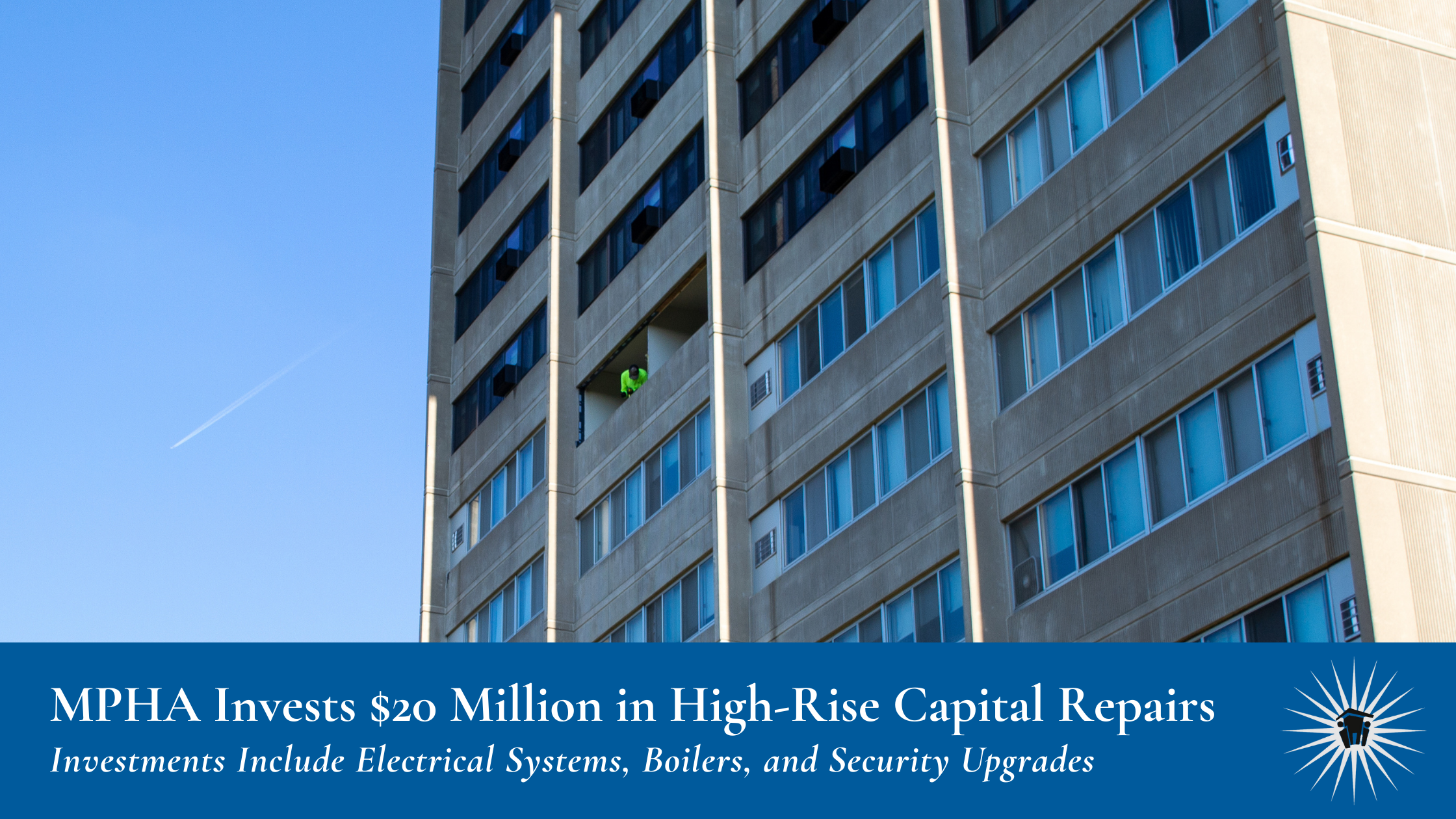In 2025, MPHA invested more than $20 million in repairs across its 42 high-rises. Major projects included electrical system upgrades, boiler system replacements, roof and window replacements, fire protection system upgrades, elevator modernizations, exterior façade restorations, and security improvements. This work helps MPHA maintain and improve critical building systems and infrastructure to ensure buildings can continue to serve the more than 5,000 residents who call one of MPHA’s 42 high-rises home.
While many buildings received some level of investment, eight high-rises had projects exceeding $1 million, including: Holland Highrise, Park Center, James R. Heltzer Manor, The Atrium, and all four Cedar High Apartments.
Holland Highrise
At Holland Highrise, nearly $6 million in repair work is underway, scheduled to conclude in 2026. A $3.17 million project replacing 30-year-old windows in the 182-unit building is expected to be completed in December. This window replacement project is funded in part by MPHA’s tax levy. Simultaneously, a $875,000 main electrical switch gear and generator replacement project is underway. Once the window replacement and electrical system upgrades are complete, MPHA will invest an estimated $1.9 million to replace a roof that has exceeded its useful life. Holland Highrise is located at 1717 Washington Street Northeast.
Park Center
MPHA completed $1.7 million in repairs across three projects at Park Center. A $1.4 million roof replacement in November addressed a decades-old roof that had surpassed its useful life. Earlier in the year, MPHA deployed the final $300,000 of a $1.1 million project to upgrade the building’s main electrical switch gear and replace the building’s generator. MPHA will also be replacing showers in the building’s accessible units this winter. Park Center is located at 1515 Park Avenue.
James R. Heltzer Manor
MPHA invested $2.37 million to replace decades-old windows at the 110-unit James R. Heltzer Manor that was completed earlier this spring. James R. Heltzer Manor is located at 2121 South Minnehaha Avenue.
The Atrium
The Atrium, MPHA’s only downtown high-rise, received a $1.55 million investment to upgrade the building’s main electrical switch gear and replace its generator. Three-hundred and six residents call The Atrium home, and it is located at 314 Hennepin Avenue.
Cedar High-Rise
630 Cedar Avenue is currently undergoing $1.13 million in improvements. MPHA is upgrading the electrical system and replacing a boiler plant in the 191-unit high-rise, work that is partially funded through Minnesota Housing’s Publicly Owned Housing Program. The 630 Cedar Avenue projects are expected to be completed in the spring of 2026.
Cedar Mid-Rise Apartments
Clustered together in the Cedar-Riverside neighborhood, the three Cedar mid-rise buildings collectively received nearly $3 million dollars in improvements in 2025. MPHA replaced decades old, worn and chipped flooring throughout corridors, entry vestibules and laundry rooms in all three buildings in March, totalling a $660,000 investment. The agency also installed new boilers in all three buildings, totalling $2.3 million. MPHA will also be upgrading the buildings’ main electrical switch gear and replacing its generator. The Cedar Mid-Rise apartments are located at 620 Cedar Avenue, 1611 South 6th Street, and 1627 South 6th Street.
This year’s more than $20 million in preservation work at the agency’s 42 high-rises comes in addition to the $4.3 million in repairs made to the agency’s portfolio of nearly 800 family homes in 2025. This work to preserve and improve MPHA’s existing units supplements the agency’s $78 million redevelopment of Spring Manor, rehabbing 221 units and building 15 new units, while the agency also builds new family homes across the city.
Historically, HUD has only provided MPHA about 10 percent of the funding it needs to maintain its buildings. That means each year the agency is forced to choose band-aid options to triage leaky roofs, repair and maintain brick façades, replace inefficient 30-year-old windows, or replace original high-rise electrical and plumbing systems instead of more comprehensive—albeit more expensive—solutions. Over time, this problem has only compounded, creating the agency’s current capital backlog of $290 million in needs.
In recent years, agency staff have pursued and maximized just about every tool possible to address this funding gap. This includes seeking special budget permissions from HUD to develop localized solutions, creating new public-private partnerships to leverage debt financing and equity investments for major renovation projects (while maintaining strong guardrails to protect residents and public ownership), accessing project-based funding supports at every level of government, and pursuing one-time and ongoing financial supports from state and local governments, like the housing levy.



